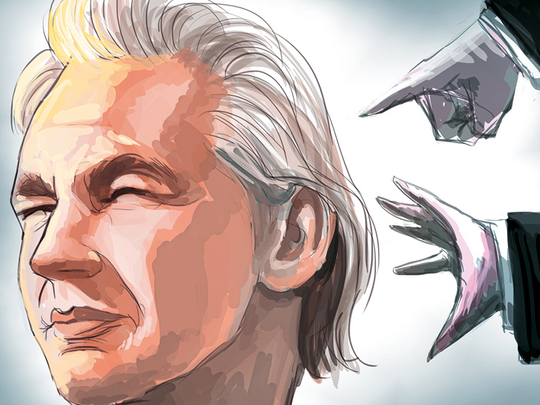
Founder of WikiLeaks Julian Assange is neither sinner nor saint. He is first and foremost a journalist and a courageous one at that. He fearlessly took on the political establishment wielding one of the greatest weapons of all — the truth. However, the truth did not set Assange free, just the opposite. His dissemination of inconvenient truths has made him a target of the United States, which doesn’t appreciate having its dirty laundry aired.
The Obama administration refrained from going after Assange in a direct manner due partly to First Amendment free speech constraints and because his arrest would set a precedent that could see editors of other news outlets, known to have published the same material, prosecuted.
After all, Assange didn’t steal any secrets himself. He merely relayed them for public consumption, which is what investigative journalists have always been known to do.
If not for Seymour Hersh the atrocities committed against civilians in My Lai and the abuse of detainees at Abu Ghraib may never have been uncovered. Yet while Hersh received a Pulitzer Prize for his reporting, Assange, little more than a messenger, is a marked man.
Erroneous ‘traitor’ label
Assange’s ‘crime’ rests on the fact that he has been more successful than most in gaining a massive readership that considers his revelations trustworthy and he is therefore able to sway public opinion in different directions, which US lawmakers accuse him of doing vis-a-vis the presidential election.
Secondly, the traitor label some like to slap him with is erroneous because he is neither American nor British. He is an Australian national. So he isn’t an information thief and neither can he be accused of betraying his own country unless Australia is a de facto US satellite.
Assange has always believed that a Swedish prosecutor’s determination to see him extradited to Sweden to answer questions related to rape allegations was a politically-motivated prelude to his eventual extradition to the US where he could face life imprisonment.
Given Sweden’s hard line stance towards a man who has not been charged with anything but who was merely wanted for questioning, he might have a point. It took almost five years for Sweden to agree to interview him inside the Ecuadorean embassy in London where he was forced to take refuge.
In light of Sweden’s statutes of limitations on prosecutions for certain offences, Assange might have seen some light at the end of his long and lonely tunnel. Not so if the UK and the US have their way.
America has a history of punishing whistleblowers and now the UK may be taking the same line. A new draft law covering everyone who “not only communicates information” but “obtains or gathers it” is being mulled. If passed, offenders could spend up to 14 years in prison. Under the pretext of security, the political establishment is pulling up the drawbridge on its secrets.
New impetus
Simultaneously, there has been a new impetus in Washington to prosecute Julian Assange for espionage driven by no other than President Donald Trump himself. US Attorney-General Jeff Sessions has referred to Assange’s arrest as “a priority”.
Assange’s lawyer Barry Pollack insists that WikiLeaks is no different from any other entity publishing material in the public interest. “Democracy thrives because there are independent journalists reporting on what it is that the government is doing,” he said. He’s absolutely right. Journalists in democratic countries have an innate responsibility for holding authority to account.
With Sweden and the US both champing at the bit to wrest him from kindly Ecuadorean clutches — and potentially Britain as well down the road — Assange would do well to channel Houdini.
Unfortunately, the government of Ecuador had already submitted to pressure from Washington by depriving their guest of internet access in the run-up to the US presidential election. If he is deprived of his tiny one-roomed sanctuary, he faces arrest and extradition. That would be another notch on Trump’s increasingly authoritarian belt and a very sad day for one of the West’s most cherished freedoms.
Linda S. Heard is an award-winning British political columnist and guest television commentator with a focus on the Middle East.









